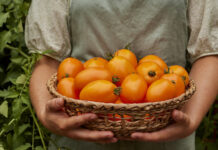
Did you know that certain plants can grow better together? Recently, companion planting has made a resurgence from those trying to stay away from synthetic inputs to deter pests. Insects and mammals have a tendency to like the same foods we do in the garden, yet planting certain varieties together can create elements to help keep them at bay. (Think how you might not order a favorite meal at a restaurant if it’s made with an ingredient you hate.) Here’s information from DripWorks:
Deterring Pests. A great example of a plant that deters pests is chrysanthemums, a perennial flower that repels insects like spider mites, Japanese beetles, aphids, and even ticks. These beautiful flowers can be interspersed throughout the garden for a natural pest repellent. Other helpful pest-repelling plants include marigolds, basil, mint, and lemongrass.
Distracting Pests. Another way that companion plants can help is by attracting pests to themselves instead of prized plants. Petunias and nasturtiums are two flowers that attract insects to their own leaves, so bugs are more likely to leave others alone.
Attracting Beneficials. Companion planting also includes using flowers and herbs that attract pollinators and other helpful insects that will eat the pesky ones. Bee balm, lavender, sunflowers, zinnias (shown above), and marigolds are great flowers to bring beneficial pollination into your vegetable garden, increasing yields and biodiversity.
Fixing Nitrogen. Some other plants help to fix nitrogen in the soil, a key ingredient for plant growth. Nitrogen-fixing plants form symbiotic relationships with bacteria, which are able to convert the nitrogen from the air into a form that is usable by plants in the soil. Soybeans are the most well-known nitrogen-fixing plant, but others include clover varieties, Partridge peas, and hairy vetch.
Common Companions
Tomatoes: Some of the best plants to locate near tomatoes are basil, marigolds, nasturtiums, garlic, and chives because they may repel bugs and enhance flavor and growth.
Cucumbers: Plants to include near cucumbers include peas, beans, beets, dill, oregano, and marigolds. Chrysanthemums and tansys are also a great addition to repel cucumber beetles.
Corn: As with the previous veggies, marigolds are an excellent companion plant for corn. Pole beans and squash are traditionally part of the ‘three sisters’ traditional style of companion planting, and borage and dill can be great additions. To prevent corn earworm, it’s best to attract natural predators such as ladybugs and green lace wigs. Ladybugs love nasturtiums, calendula, marigolds, and dill.
Cabbage: The best companions for cabbage and other plants in the brassica family include beans, marigolds, and a wide variety of aromatic herbs. Seasoned gardeners know to beware of cabbage moths and cabbage worms when young plants are vulnerable. Nasturtiums will attract the pests to themselves, away from cabbage, while other plants such as dill, lavender, and garlic are said to deter them.
Strawberries: Fruit can also utilize companion planting to avoid an overabundance of pests. The best companions to include nearby are borage, caraway, chives, sage, and spinach. Their different growing patterns ensure no single plant will take too many nutrients or sunlight from another.
Keep in mind, the right drip irrigation system will ensure plantings grow strong. Find a variety of articles from DripWorks about the advantages of drip irrigation, installation, and water conservation here. This article was edited from an original, which appears here.











![[VIDEO] Dickies®: Discover Workwear That’s Anything But Uniform](https://turfmagazine.com/wp-content/uploads/2023/06/1647663814-4b1a2a7742790a9b1e97a3b963477850192e1d6a9dfba9b07214a77bae25d6e3-d-218x150.jpg)




























![[VIDEO] Dickies®: Discover Workwear That’s Anything But Uniform](https://turfmagazine.com/wp-content/uploads/2023/06/1647663814-4b1a2a7742790a9b1e97a3b963477850192e1d6a9dfba9b07214a77bae25d6e3-d-324x160.jpg)